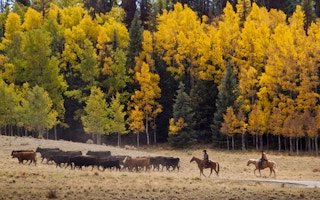A group of large companies, mainly in the food sector, have promised to reduce their role in the destruction of the world’s forests, and a new online portal launched on Wednesday aims to hold them to their word.
Some of the biggest names in global food production, processing and retailing, including Cargill, McDonalds, Marks & Spencer, Tesco and Walmart are among the companies, with a combined market capitalization of nearly $4 trillion, pledging to tackle deforestation in their supply chains.
The planet loses more than six million hectares of tropical rainforest a year - an area the size of Sri Lanka - a coalition of NGOs said in the report “Supply Change: Corporations, Commodities and Commitments that Count”, released in tandem with the tracking portal.
“
Large corporations have the greatest leverage to shift whole industries, which is why supply chain commitments are so critical to our evolution to a marketplace full of sustainable choices.
Jason Clay from the World Wildlife Fund
Land made available by felling tropical forests produces an estimated 70 per cent of the world’s soybeans and all of its palm oil, along with timber, cattle and other goods worth an estimated $98 billion in annual exports, the report said.
But the unchecked expansion of agriculture into tropical forests threatens the natural environment and human capital, the 32-page report said.
The portal tracks more than 300 corporate commitments to reduce deforestation, about one third of which are supposed to be achieved this year.
“Large corporations have the greatest leverage to shift whole industries, which is why supply chain commitments are so critical to our evolution to a marketplace full of sustainable choices,” Jason Clay from the World Wildlife Fund (WWF), one of the groups backing the portal, said in a statement.
New commitments from companies related to reducing deforestation have risen 30 per cent year-on-year since 2009, and grew 80 per cent in 2013-14, meaning more companies are taking the problem seriously, the report said.
Specific targets include pledges by food companies to make sure the palm oil they purchase for their products meets the standards of the Roundtable on Sustainable Palm Oil (RSPO), which prohibits clear-cutting old forests with “high conservation values” to build plantations.










